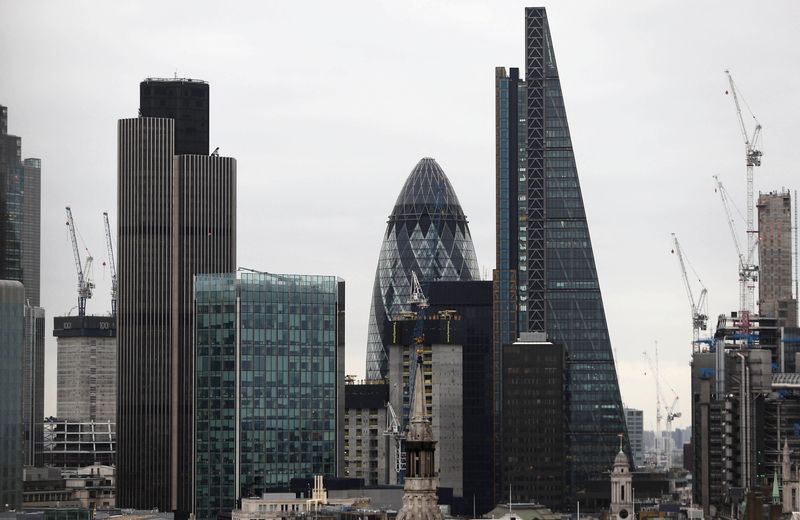By William Schomberg and Andy Bruce
LONDON (Reuters) -Britain's economy grew more quickly than previously thought in late 2021 but the increase was largely due to COVID-related activity in the health sector, which masked the inflation hit to household incomes and a gloomy picture for the private sector.
Gross domestic product in the world's fifth-biggest economy increased by 1.3% in the fourth quarter, when the Omicron wave of coronavirus cases mounted, official data showed on Thursday.
That was stronger than a preliminary estimate of growth of 1.0% from the previous three-month period.
But the largest contributors to the increase came from health and social work including more visits to doctors, a large increase in coronavirus testing and tracing and an extension of the COVID-19 vaccination programme.
Paul Dales, an economist with consultancy Capital Economics, said the upward revision to GDP was not as encouraging as it looked at first glance.
"A lot of it appears to be due to inventories while consumer spending was revised down," he said. "The latter suggests the squeeze on real incomes is starting to bite, although the fall in the saving rate is providing a cushion."
Households dipped into their lockdown savings to finance their spending. The saving ratio fell to 6.8% of disposable income from 7.5% in third second quarter, heading back towards its level of 6.0% immediately before the pandemic.
Last week, finance minister Rishi Sunak announced tax cuts to help soften the hit to consumers from surging energy prices which have risen further after Russia's invasion of Ukraine.
While fourth-quarter growth pick-up represented an acceleration from the economy's 0.9% expansion in the third quarter, it was well below its 5.6% expansion in the April-June period when it was rebounding from COVID-19 lockdowns.
HOUSEHOLDS HIT
Investors expect the recovery to slow in 2022 as inflation heads for almost 9% and households face the biggest fall in living standards since at least the 1950s, according to forecasts by the government's fiscal watchdog.
Thursday's data showed household disposable income, adjusted for inflation, fell by 0.2% in the July-September period, revised down from an originally reported 0.5% increase, and it fell again by 0.1% in the fourth quarter.
The dip in the third quarter reflected the increased impact of inflation on household budgets and a downward revision of pension contributions, the Office for National Statistics said.
Household incomes as a share of all income in Britain's economy, which includes business and government income, fell to 72.2%, its lowest since records began in 1987.
Real household disposable spending in the fourth quarter rose by 0.5%, weaker than an original estimate of 1.2% growth.
Samuel Tombs, an economist with Pantheon Macroeconomics, said the data showed companies were also struggling.
White Britain's economic output at the end of 2021 was only 0.1% below where it was at the end of 2019, excluding government expenditure and investment it was 2.9% below its pre-pandemic level, he said.
Britain's balance of payments deficit in the fourth quarter narrowed to 7.3 billion pounds ($9.59 billion), helped by the first surplus since 2011 in the balance of British investment income abroad and foreign investment income in the country.
Economists polled by Reuters had expected a deficit of 17.6 billion pounds.
The ONS said the investment account surplus was driven by higher income from British assets in the oil sector abroad and a change in the schedule of dividend payments at home.

As a share of GDP, the overall current account deficit narrowed to 1.2% from 4.9% in the third quarter.
($1 = 0.7611 pounds)